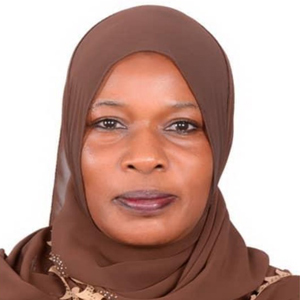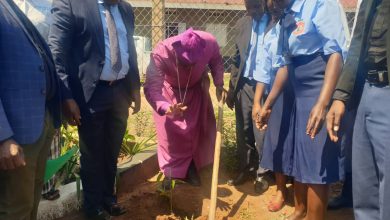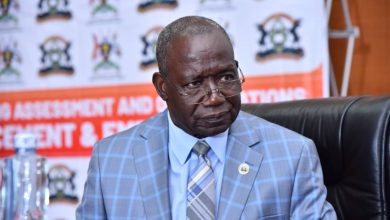What Kyambogo’s Eight PhD Graduates Add to the Country

Education
An institution with deep roots in teacher education training, seven of the PhD graduands today are from the School of Education with only Nicholas Mwebaze from the Faculty of Science.
Kyambogo University will, today, celebrate eight PhD in various disciplines as it conducts its 20th graduation ceremony.
An institution with deep roots in teacher education training, seven of the PhD graduands today are from the School of Education with only Nicholas Mwebaze from the Faculty of Science.
The seven are Emmanuel Bileti Acidri, Joseph Ntege Lubwama, Safina Mutumba and Kirabo Nkambwe Nakasiita.
Others are Eunice Ndyareeba, Agnes Tugulwa and Wilberforce Turyahikayo.
Kyambogo University was established in 2003 by the Universities and Other Tertiary Institutions Act 2001 by merging Uganda Polytechnic Kyambogo, the Institute of Teacher Education, Kyambogo, and the Uganda National Institute of Special Education.
Below is citation for each PhD candidate;
 Nicholas Mwebaze | Study Reveals Aerobic Exercise Significantly Improves Clinical Outcomes for HIV-positive
Nicholas Mwebaze | Study Reveals Aerobic Exercise Significantly Improves Clinical Outcomes for HIV-positive
A groundbreaking study by Mr Mwebaze highlighted the transformative impact of aerobic exercise on the clinical outcomes of HIV-positive clients at General Military Hospital-Bombo.
Employing a quasi-experimental design with pre- and post-tests, the research involved two randomly selected groups—control and experimental—to assess the effects of a structured 12-week moderate-intensity aerobic exercise regimen.
Key clinical outcomes examined included immunological markers such as the Cluster of Differentiation 4 (CD4) count, functional work capacity measured through the Rate of Perceived Exertion (RPE) and Duke Activity Status Index (DASI), and psychological markers assessed via a validated questionnaire.
The findings revealed significant improvements among participants in the experimental group who engaged in supervised aerobic exercises at a tempo of 120–150 beats per minute:
-
- Enhanced Immunity: A notable increase in CD4 count, reflecting strengthened immune function.
-
- Improved Functional Work Capacity: Participants demonstrated reduced heart rates and increased VO₂ max levels.
-
- Better Psychological Well-Being: Significant reductions were observed in markers of paranoid ideation, depression, neuroticism, anxiety, and phobia for both male and female clients.
This evidence underscores the role of aerobic exercise as an effective complementary therapy to Anti-Retroviral Therapy (ART) for managing HIV.
The study recommends the adoption of a standardized aerobic exercise protocol by Uganda’s Ministry of Health to bolster care for HIV-positive individuals.
The research further aligns with the Presidential Initiative on Healthy Lifestyle in Uganda, emphasizing the vital role Exercise and Sport Science play in combating global health challenges.
The self-funded study was supervised by Associate Professor Constance Nsibambi and Associate Professor Edward Ojuka, marking a significant contribution to public health and exercise science in Uganda.
 Joseph Lubwama-Ntege | Study Highlights Effective Inspection Approaches for Improving Teacher Instruction
Joseph Lubwama-Ntege | Study Highlights Effective Inspection Approaches for Improving Teacher Instruction
Mr. Joseph Lubwama-Ntege completed a pivotal study investigating the relationship between inspection approaches and teacher instructional effectiveness in government-aided primary schools in Central Uganda.
The research focused on three inspection methods—directive, non-directive, and collaborative—and their impact on teaching outcomes.
Grounded in teacher performance theory and guided by the pragmatist research philosophy, the study adopted a mixed-methods approach to analyze data. The findings revealed the following:
-
- Directive Inspection Approach: This method showed no significant relationship with teacher instructional effectiveness.
-
- Non-Directive Inspection Approach: A moderate relationship was established, indicating some positive impact on teaching quality.
-
- Collaborative Inspection Approach: This method demonstrated a strong and positive relationship with instructional effectiveness, marking it as the most impactful approach.
Based on these findings, the study recommends that school inspectors in government-aided primary schools prioritize the use of collaborative and non-directive inspection methods to enhance instructional practices.
These approaches foster a more effective and supportive environment for teachers, ultimately improving educational outcomes.
This self-sponsored research was supervised by Associate Professor George Wilson Kasule and Dr Phillip Owino, contributing valuable insights into education management and teacher development in Uganda.
 Safina Mutumba | Study Highlights the Importance of School-Community Partnerships in Early Childhood Care and Education
Safina Mutumba | Study Highlights the Importance of School-Community Partnerships in Early Childhood Care and Education
Ms Safina Mutumba conducted an in-depth exploration of school-community partnerships in implementing integrated Early Childhood Care and Education (ECCE) services in pre-primary schools in Uganda.
Using social capital theory as a framework, the study focused on child stimulation and learning, child safety and protection, and healthcare practices, with data collected from pre-primary schools in Kira Municipality.
The research revealed significant challenges in implementing integrated ECCE services, including a lack of coordination among line ministries, agencies, and local communities.
While some partnerships, such as those focusing on safety, healthcare planning, and capacity building, were in place, they were inadequately utilized.
Key findings emphasized that integrated services—encompassing education, health, nutrition, child safety, and protection—could be more effectively implemented through robust collaboration and partnerships among stakeholders.
To bridge gaps in service delivery and promote holistic child development, the study proposed:
-
- Academic Events and Shared Learning: Enhance early stimulation and learning through collaborative activities between schools and communities.
-
- Child Abuse Mitigation Measures: Strengthen partnerships aimed at ensuring the safety, protection, and well-being of children.
-
- Healthcare Services Integration: Facilitate access to comprehensive health services for all children, regardless of their location.
The findings underscore the transformative potential of partnerships in providing a holistic package of services to pre-primary school children.
This partially Ministry of Education and Sports-funded research was supervised by Sr Dr Evangelista Busingye and Dr John Samson Maani, offering critical insights into strengthening ECCE service delivery in Uganda.
 Kirabo Nakasiita Nkambwe | Study Links Mindset, Interest, and Teaching Strategies to Improved Self-Regulated Learning in Mathematics
Kirabo Nakasiita Nkambwe | Study Links Mindset, Interest, and Teaching Strategies to Improved Self-Regulated Learning in Mathematics
Ms Kirabo Nakasiita Nkambwe’s research delved into the interplay between students’ mindsets, interest in mathematics, and teaching strategies on Self-Regulated Learning (SRL) among lower secondary school students in Uganda.
Using a mixed-methods approach, the study uncovered key factors influencing learners’ ability to self-regulate their study of mathematics.
Key Findings
-
- Growth Mindset: A growth mindset—where students believe their abilities can improve through effort—was shown to significantly enhance SRL in mathematics, particularly when students displayed a genuine interest in the subject.
-
- Teaching Strategies: The study highlighted that interactive teaching strategies, combining both teacher-centred and learner-centred methods, amplified the positive effects of a growth mindset on SRL.
-
- Influence of Gender and Stakeholders: Factors such as gender, parental influence, teacher input, and misconceptions about mathematics played a critical role in shaping students’ mindset and interest in the subject.
To foster self-regulated learning in mathematics, the study proposed the following measures:
-
- Foster a Growth Mindset: Encourage stakeholders to shift students’ perceptions from a fixed mindset to a growth mindset through targeted interventions.
-
- Boost Interest in Mathematics: Cultivate interest in mathematics by addressing misconceptions and making the subject relatable and engaging.
-
- Refine Teaching Strategies: Equip teachers with student-focused instructional methods that cater to individual learning needs.
-
- Engage Parents and Guardians: Involve parents in their children’s learning journey to reinforce positive attitudes toward mathematics.
-
- Collaborate Across Stakeholders: The Ministry of Education and Sports, the National Curriculum Development Centre, and other partners should work collaboratively to implement mindset and interest-enhancing programmes.
This research, partly funded by Kyambogo University, underscores the importance of a holistic approach to mathematics education.
By addressing psychological, pedagogical, and societal factors, the study paves the way for producing students who are self-regulated learners and better equipped to succeed in mathematics.
The study was supervised by Dr Ali Baguwemu, Dr Henry Kibedi, and Associate Professor David Kani Olema.
 Eunice Ndyareeba | Study Explores the Role of Self-Efficacy in Academic Engagement Among Adolescent Students in Kabale District
Eunice Ndyareeba | Study Explores the Role of Self-Efficacy in Academic Engagement Among Adolescent Students in Kabale District
Ms Eunice Ndyareeba conducted a psychological investigation examining how self-efficacy mediates the relationship between adolescents’ achievement goal orientation and their academic engagement.
The study, conducted in Kabale District, Uganda, sheds light on the complex dynamics that drive academic success among secondary school students.
Key Findings
-
- Self-Efficacy and Achievement Goals: The research revealed that students who received holistic support from parents and external sources (e.g., mentorship, academic rewards) developed stronger self-efficacy. This was particularly true when students’ achievement goals were oriented towards personal skill enhancement, resulting in increased academic engagement.
-
- Parental Support: Interestingly, students whose parents had lower educational backgrounds but offered social and emotional support were more likely to engage academically.
-
- Teacher-Student Relationships and Goal-Oriented Tasks: Positive teacher-student relationships and academic tasks linked to future careers and employability also played a key role in fostering academic engagement.
Recommendations
To further enhance academic engagement among adolescents, the study recommends the following:
-
- Professional Development for Teachers: Continuous training for educators to cultivate healthier relationships with students and to strengthen their mentorship skills.
-
- Goal-Setting Training for Students: Provide training in goal-setting to help students define and pursue their academic and career aspirations.
-
- Parental Involvement: Encourage parents to create a supportive home environment that emphasizes personal skill development over unhealthy academic competition, helping students to overcome challenges confidently.
-
- Positive Feedback and Academic Rewards: Implement systems for rewarding academic achievement and providing constructive feedback to motivate students.
The findings underscore the importance of an integrated support system, including parental involvement, teacher mentorship, and goal-setting strategies, in fostering self-efficacy and improving academic outcomes.
This study, partially funded by Kabale University, was supervised by Dr Judith Biirah, Dr Henry Kibedi, and Prof Zanna Clay.
 Agnes Tagulwa | Quality Assurance Practices that Enhance Employability of Students in Public Universities
Agnes Tagulwa | Quality Assurance Practices that Enhance Employability of Students in Public Universities
Ms Agnes Tagulwa conducted a study exploring the quality assurance practices that contribute to the employability of students from public universities in Uganda, with Kyambogo University serving as the case institution.
The study focused on key practices such as curriculum review, industrial training, and career services, investigating their roles in enhancing students’ employability.
Key Findings
-
- Curriculum Review, Industrial Training, and Career Services: The study found that these three quality assurance practices were strongly and positively correlated with the employability of students.
-
- Employer Expectations: Employers expect students to possess both theoretical knowledge and a broad range of personal and interpersonal skills. This suggests that employability is not solely based on hard skills but also on the acquisition of generic skills, which can be fostered through these quality assurance practices.
-
- Holistic Competence-Based Approach: The integration of curriculum review, industrial training, and career services supports a competence-based approach, which equips students with the necessary skills for the workforce.
Recommendations
The study emphasizes the need for the following measures to further enhance employability:
-
- Collaborative Curriculum Review: Engage key stakeholders, including industry professionals, in the curriculum review process to ensure that academic programs meet the current needs of the job market.
-
- Government Legal Framework: Advocate for a structured legal framework that promotes collaboration between universities, industries, and government, ensuring that training and research are aligned with economic and social development goals.
-
- Industry Partnerships: Strengthen partnerships between academic institutions and industry to provide students with practical experiences through industrial training and career services.
By improving these practices, the study suggests that universities can significantly enhance students’ employability, preparing them for the competitive job market after graduation.
This self-sponsored study was supervised by Sr Dr Maria Goretti Kaahwa and Dr Philip Owino.
 Wilberforce Turyahikayo | Antecedents of Organisational Effectiveness in Public Universities in Uganda
Wilberforce Turyahikayo | Antecedents of Organisational Effectiveness in Public Universities in Uganda
Mr Wilberforce Turyahikayo conducted a correlational study to investigate the antecedents of organisational effectiveness in public universities in Uganda.
The study involved university officers, administrative officers, deans of schools and faculties, and academic heads of departments from four public universities.
Key Findings
-
- Leadership Styles and Communication: The study found that both leadership styles and communication were significant positive antecedents of organisational effectiveness. Effective leadership and communication were essential for enhancing the overall performance and success of the institutions.
-
- Institutional Culture: While institutional culture had a positive impact on organisational effectiveness, it was found to be an insignificant antecedent in this context.
-
- Leadership Styles and Communication: The study revealed that leadership styles were strong antecedents of organisational communication, which in turn, was a significant antecedent of organisational effectiveness.
-
- Moderating and Mediating Roles: Organisational culture played a moderating role in the influence of leadership styles on organisational effectiveness. Additionally, communication was found to mediate the relationship between leadership styles and organisational effectiveness.
Recommendations
The study recommends the following strategies for improving organisational effectiveness in public universities:
-
- Adopt Effective Leadership Styles: University managers should employ leadership styles that promote collaboration, trust, and communication to improve organisational outcomes.
-
- Promote Institutional Culture: Strengthening institutional culture, while not an immediate determinant, is essential for long-term success and should be nurtured through appropriate leadership.
Implement Effective Communication: Universities should invest in communication strategies that foster transparency, efficiency, and alignment between leadership and employees, which in turn enhances organisational effectiveness.
This self-sponsored study was supervised by Assoc Prof George Wilson Kasule and Dr Wilson Mugizi.




